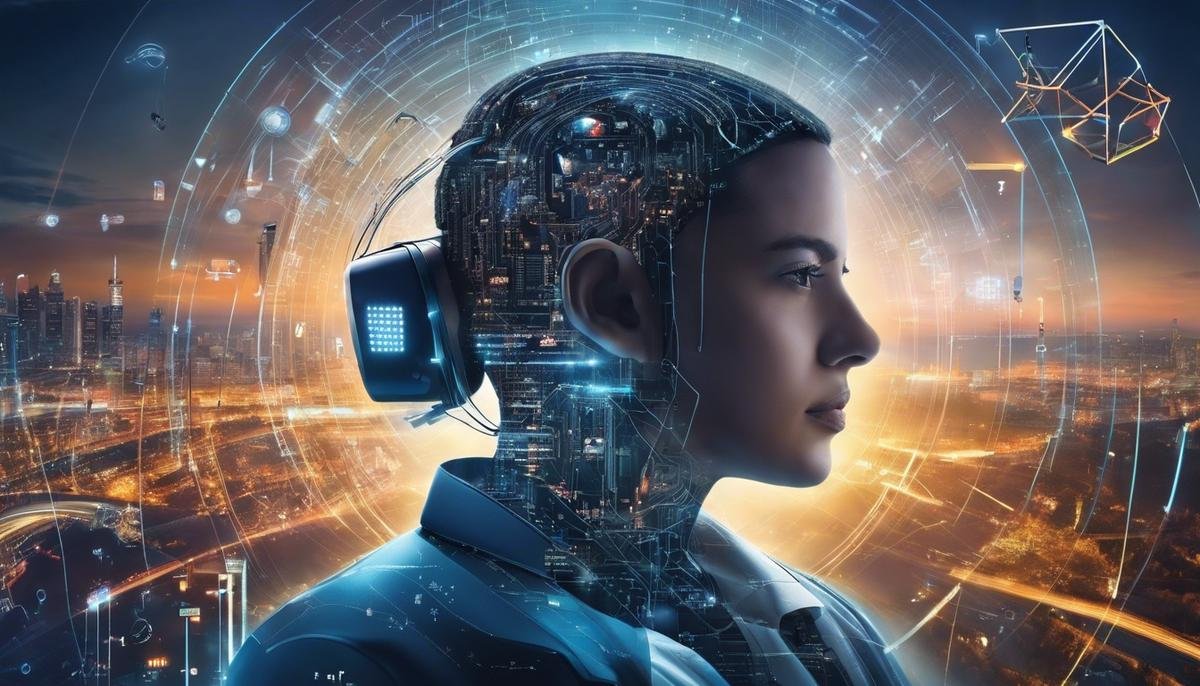In the realm of technology, artificial intelligence stands as an intriguing marvel. A concept once confined to the imaginative realm of science fiction, it now permeates every aspect of modern society. The journey of artificial intelligence, its origin, transformation, the sub-disciplines it encompasses, and the profound impact it has on our society holds a fascination that cannot be understated. Furthermore, as its influence broadens, so does the complex web of ethical questions it poses. Understanding this multifaceted field, its potential, and implications for the future, allows us not only to appreciate the marvels of AI, but also better navigate the evolving techno-centric society.
Foundational Aspects of Artificial Intelligence
Subject: Laying the Foundation: Core Concepts and Theories in Artificial Intelligence
Artificial intelligence (AI) is, without contradiction, one of the most dynamic and transformative fields of the 21st century. Present in numerous sectors from healthcare to transportation, its increasing integration into daily life necessitates an understanding of the core concepts and theories that form the basis of this paradigm-changing technology.
At its core level, artificial intelligence is a branch of computer science that aims to implement computational systems capable of performing tasks that would usually require human intelligence, such as understanding natural language, object identification, problem-solving, and learning and adapting to new information. Intricate theories coupled with foundational concepts form the bedrock of this field.
- Turing Test: One cannot discuss artificial intelligence without considering Alan Turing and his landmark ‘Turing Test.’ Proposed in 1950, this test is the most recognized measure of a machine’s ability to exhibit intelligent behavior equivalent to, or indistinguishable from, human intelligence. The continued relevance of the Turing test emphasizes the ongoing quest to create machines with human-like intelligence.
- Machine Learning: Essentially, machine learning comprises algorithms that allow computers to learn directly from data without being explicitly programmed. Rooted in statistical theory and optimization, machine learning is subdivided into categories such as supervised, unsupervised, and reinforcement learning. Each subgroup offers a unique approach to solve complex, data-driven problems.
- Neural Network: A primary concept underpinning AI is the idea of the neural network, a system that mirrors the human brain’s biological networks. Composed of interconnected nodes or ‘neurons,’ neural networks help these machines interpret sensory data, identify patterns and ‘learn’ over time, thereby creating a phenomenon known as ‘deep learning.’
- Natural Language Processing (NLP): A vital component of AI research is NLP, which enables computers to understand and respond to human language, both written and spoken. Semantics, syntax, and discourse analysis form the cornerstone of this discipline, empowering more meaningful interactions between humans and machines.
- Heuristic Search: In the realm of AI, heuristic search refers to techniques that optimize problem-solving and decision-making by leveraging experience-based solutions, thus embodying AI’s capacity for ‘learning.’
- Ethics of AI: Roundly, ethics forms a crucial part of AI study. The drive towards creating more autonomous machines necessitates stringent ethical parameters to eliminate bias, ensure transparency, and promote responsible use of AI, thus safeguarding the essential values of humanity.
By delving relentlessly into the core concepts and theories listed above, researchers and scholars of artificial intelligence aim to deepen understanding, drive innovation, and harness the full potential of this transformative field. Yet, as any earnest academic or scientist would acknowledge, the depth of AI’s grasp is as limitless as our own capacity for curiosity and learning.

Disciplines within Artificial Intelligence
Title: An Introduction to the Interdisciplinary Approach to Advancing Artificial IntelligenceIn assessing the contribution of various fields to the progress of Artificial Intelligence (AI), it is critical to consider the collaborative roles played by different academic and technological disciplines. This interconnectedness gives rise to a pioneering amalgamation of understanding, techniques, and applications in the world of AI.
To illustrate, consider the role of Statistics, a pivotal discipline that provides AI with the ability to discern patterns, forecast phenomena, and make data-driven decisions. It powers algorithms that are fundamental to Machine Learning – a subfield we’ve previously touched upon – enabling these systems to learn from the patterns they identify in data sets.
Computer Vision, another vital discipline, captures and interprets visual data. Here, intricate statistical models are instrumental for machines to comprehend saturation, modify image qualities, or even distinguish cat photos from dog photos. This discipline empowers AI with a form of ‘sight’, thereby expanding interaction capabilities with the surrounding world.
Delving further, let us consider Cognitive Science, studying human cognition, perception, and behavior. This discipline provides AI with models for memory, learning, and decision-making. It is by unfolding the mysteries intrinsic to the human mind that AI acquires aspirational characteristics of creativity, empathy, and self-correction. By mirroring human cognitive abilities, AI systems can achieve more nuanced and complex applications, including autonomous vehicles or interactive robots.
For an understanding of language, Linguistics plays an integral part. Coupled with Natural Language Processing – which we have previously discussed – it allows AI systems to comprehend, generate, and translate human language effectively. This discipline also provides insights into the complex semantics, pragmatics, and sociolinguistic aspects involved in communication, endowing AI with the capacity to engage in sophisticated dialogues.
Moreover, contemplating the field of Philosophy offers a nuanced perspective. From reasoning logic to ethical concerns – as previously mentioned – the philosophical lens equips AI with a framework to deal with complex questions of morality, existence, and knowledge. It permits a higher, more reflective abstraction that AI incorporates into its design and operational principles.
Another discipline worthy of note is Robotics, directly linked with AI. It materializes AI concepts into physical entities, enabling them to interact with their environment. From industrial automation to personal assistants, Robotics ushers AI into concrete, practical applications extending far beyond software.
Finally, in a more peripheral yet equally influential light, disciplines such as Psychology, Sociology, and Anthropology offer insights into human behavior and societal norms. These contribute to the development of emotionally intelligent and culturally sensitive AI that can seamlessly embed in human societies.
In conclusion, the advancement of AI is a linguistic symphony, a mathematical ballet, an ethical conundrum, and a philosophical debate woven together with a shared pursuit of progress and knowledge. Each discipline adds a unique piece to the complex jigsaw that is AI, carving its own niche in the landscape of this transformative technology. Only together can these disciplines uncover the full potential of AI and pave the way for its future.

Artificial Intelligence’s Impact on Society
Transforming Society: The Pervasive Influence of Artificial Intelligence
In the growing realm of Artificial Intelligence (AI), no stone is left unturned: from economics to security, healthcare to transportation, AI’s influence continuously stretches across a multitude of societal sectors. The fine thread of AI weaves meticulously through these sectors, subtly redefining and reshaping societal operations and delivering solutions to complex issues rooted in the traditional framework of systems.
In economic spheres, AI and automation have changed the dynamics of labor markets. Many jobs, particularly those that involve repetitive tasks, are being redefined, making way for AI implementation. Meanwhile, new roles have been created based on the need for managing and improving these intelligent systems. Hence, the economic impact of AI outlines a potent shift in labor market trends, calling for a more versatile workforce adept at managing technological advancements.
Regarding national and global security, AI advancements contribute to more sophisticated surveillance and defense systems. Facial recognition technology, predictive policing, and automated drones are few among the plethora of AI tools boosting security measures. However, they also pose new challenges regarding the protection of civil liberties and individual privacy, demanding stringent legal and ethical frameworks to maintain a fine balance.
AI’s influence expands significantly into the healthcare field. From expediting drug discovery processes to improving diagnostics through Deep Learning and improving patient outcomes via telehealth services, AI has made significant strides. Interestingly, AI also finds itself at the heart of remote patient monitoring and personalized medicine, underscoring its potential in transforming healthcare delivery models.
In transportation, AI-driven autonomous vehicles cast an entrancing vision of the future. Though still under development, these vehicles hold promise in alleviating traffic congestion, reducing human error-induced accidents, and optimizing energy use. However, questions around safety, acceptance, and legislation still pose formidable challenges to their widespread adoption.
Even in the realm of arts and culture, AI’s impression is visible. AI algorithms have been utilized to create music, write stories, and design artwork, challenging traditional notions of creativity. Despite concerns among purists, these ventures push boundaries and question preexisting limitations in the functions of AI.
Education is not immune to AI’s transformational power either. Incorporating intelligent tutoring systems, adaptive learning programs, and automated grading tools, AI has begun reshaping pedagogical methods and learning experiences. While the utility of AI in education is immense, it raises questions of equitable access and the importance of human interaction in learning environments.
Last but not least, in the environmental realm, AI aids in conservation efforts, climate change modeling, and optimizing energy consumption. AI-powered data analysis tools are essential in predicting environmental patterns and implementing sustainable practices. However, the energy-intensive nature of AI systems mandates the necessity for greener AI technology.
Artificial Intelligence’s thoroughly pervasive influence on various societal aspects calls for vigilance and thoughtful regulations. As the boundaries of AI expand, it becomes ever more urgent to ensure its extensive benefits are harnessed judiciously while mitigating any negative repercussions. Indeed, continuous refinement and thoughtful engagement with AI technology will facilitate opportunities for human progress never before seen in the annals of history.

The Ethics of Artificial Intelligence
AI technologies present a remarkable frontier of discovery and innovation, rife with potential benefits but also fraught with profound ethical considerations. The effective deployment of AI technologies requires rigorous address of these ethical considerations, some of which cut deeply into societal norms and values.
Chief among these issues is the matter of privacy. AI systems’ capacity for large-scale data analysis clearly has potential to benefit society, but it simultaneously risks infringing on personal privacy. Personal and sensitive information from social media, health records, financial transactions, biodata from wearables, and other sources are regularly processed by AI systems. Ensuring stringent data protection standards is paramount to maintain the trust and safeguard the rights of individuals. A balance has to be struck between harnessing the power of AI and honoring one’s right to privacy.
Next is the question of fairness. Can we ensure that our AI systems do not unintentionally incorporate and propagate bias and discrimination? As AI systems are trained on data generated by humans, they are susceptible to inheriting any biases present in that data. Algorithms can perpetuate or exacerbate biases against specific demographic groups when used in fields like hiring, lending, law enforcement, or healthcare. Therefore, fairness must be considered, and measures must be taken to prevent any form of discrimination.
Third, the matter of transparency. Given the ‘black box’ nature of many AI algorithms, where processes and decision-making criteria are often opaque, ensuring transparency becomes an ethical mandate. Stakeholders require an understanding of how these decisions are made, especially if AI decisions have a direct impact on personal life or business. Providing a transparent decision-making process aids in maintaining trust and accountability.
Accountability is another significant ethical concern. Who is accountable when an AI-driven system causes harm? The notion of responsibility is often hard to decipher due in part to the complexity of AI systems and their oftentimes opaque decision-making. Therefore, developing clear guidelines and regulations for accountability is a daunting, yet critical task.
Last but not least, the long-term societal impact of AI stands as a point of ethical examination. Amid the AI revolution, potential disruptions to the job market and other sectors loom large. Will job displacement outpace job creation and how can society prepare for potential disruption? A thoughtful engagement with such challenges will ensure sustainable and beneficial integration of AI.
Pouring all intellectual prowess into these ethical considerations is not only timely, but also aligns with the academic and scientific commitment to the pursuit of knowledge that respects human dignity and societal welfare. It is incumbent on all engaged in AI – from researchers to developers, policymakers, and society at large – to grapple with these ethical considerations at each step of AI development and deployment. Only then can the full potential of this remarkable technology be harnessed in a manner that serves not just economic growth or scientific advancement, but humanity itself.

The Future of Artificial Intelligence
As we look forward to the great expanse of future artificial intelligence (AI), it is crucial to consider possible trajectories of its evolution and its subsequent implications across varying domains.
A significant area of interest within the future path of AI lies in the advent of superintelligence. A superintelligent AI surpasses human intelligence across virtually all economically-relevant aspects, ranging from scientific creativity to social perceptiveness. While it may seem like an idea tied intricately to science fiction, eminent researchers and AI scholars widely accept its plausibility. It paves the way towards advanced AI applications that could exponentially amplify human capacity, offering solutions to complex issues that may currently appear unsolvable. However, the study of superintelligence also raises crucial concerns about control – how can one institute safeguards to ensure humanity doesn’t find itself at the mercy of a superior intelligence?
Moving beyond superintelligence, exploration of shared prosperity offers another compelling potential future path for AI. The notion that the benefits of AI should be accessible to all is an inherently necessary ethical basis of AI development. This includes evolving AI systems towards a path where they do not merely serve the interests of a privileged few but contribute to significant advancements in social equity, human well-being, and the empowerment of individuals throughout the world.
Furthermore, the role of AI as an economic utility, in conjunction with existing economic systems, warrants thoughtful consideration. In a future powered by AI, large organizations may not be the only ones harnessing the power of AI. Ubiquitous AI can pave the way for personalized AI systems, where individuals carry a unique instance of AI personalized for them, creating a symbiotic relationship between the user and the AI system, and thereby shifting the power dynamics of who benefits from AI.
As AI continues to advance, moves towards even greater transparency and explainability are inevitable. The proverbial black box of AI has persisted for many years, shrouding the inner workings of complex algorithms and creating a barrier towards understanding how certain decisions are made. As AI impacts increasingly greater swaths of everyday life, the need for interpretable AI – AI systems where the decision-making process is transparent and understandable by humans – will grow ever more critical.
Lastly, as the boundaries of technological capability continue to expand, further exploration into the intersection of AI and other emerging technologies, such as quantum computing, offers promising future prospects. Quantum-enhanced AI could potentially lead to significant advancements in areas such as optimization, machine learning, and sampling, to name a few.
The path of AI, hence, manifests a landscape filled with thrilling opportunities, profound challenges, undiscovered territory, and profound ethical considerations. Treading this path requires not just technological brilliance, but a deeply rooted commitment to the ideals of beneficence, autonomy, justice, and non-maleficence. This ambitious endeavor needs a collective humanity-wide effort, transcending disciplinary boundaries, and spanning philosophical, social, economic, political, and technological domains. The future path of AI may stretch far and wide, but it absolutely needs to lead to a future that values and protects our shared human interests.

The power of artificial intelligence to reshape society and potentially redefine the human experience presents a landscape brimming with possibilities and risks. As we continue on this trajectory, our understanding of AI’s potential capacities requires an accompanying awareness of its ethical implications. The importance of establishing ethical norms and policy interventions that ensure the safe, fair, and beneficial use of AI cannot be overstressed. Ultimately, as we stand at the crossroads of this AI revolution, our individual and collective responses to these challenges will determine the course of its future development. This is a journey not just of technological advancement, but also of introspection, innovation, and most importantly humanity’s ceaseless endeavor for betterment.




